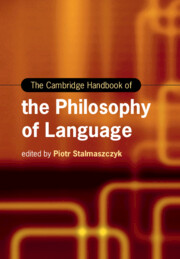Book contents
- The Cambridge Handbook of the Philosophy of Language
- Cambridge Handbooks in Language and Linguistics
- The Cambridge Handbook of the Philosophy of Language
- Copyright page
- Contents
- Figures
- Tables
- Contributors
- Preface
- 1 Philosophy of Language: Definitions, Disciplines, and Approaches
- Part I The Past, Present, and Future of Philosophy of Language
- Part II Some Foundational Issues
- 5 Philosophy of Language, Ontology, and Logic
- 6 Frege’s Legacy in the Philosophy of Language and Mind
- 7 Metasemantics and Metapragmatics: Philosophical Foundations of Meaning
- 8 Internalist Perspectives on Language
- 9 Semantic Content and Utterance Context: A Spectrum of Approaches
- 10 Semantic Minimalism and Contextualism in Light of the Logicality of Language
- Part III From Truth to Vagueness
- Part IV Issues in Semantics and Pragmatics
- Part V Philosophical Implications and Linguistic Theories
- Part VI Some Extensions
- References
- Index
9 - Semantic Content and Utterance Context: A Spectrum of Approaches
from Part II - Some Foundational Issues
Published online by Cambridge University Press: 12 November 2021
- The Cambridge Handbook of the Philosophy of Language
- Cambridge Handbooks in Language and Linguistics
- The Cambridge Handbook of the Philosophy of Language
- Copyright page
- Contents
- Figures
- Tables
- Contributors
- Preface
- 1 Philosophy of Language: Definitions, Disciplines, and Approaches
- Part I The Past, Present, and Future of Philosophy of Language
- Part II Some Foundational Issues
- 5 Philosophy of Language, Ontology, and Logic
- 6 Frege’s Legacy in the Philosophy of Language and Mind
- 7 Metasemantics and Metapragmatics: Philosophical Foundations of Meaning
- 8 Internalist Perspectives on Language
- 9 Semantic Content and Utterance Context: A Spectrum of Approaches
- 10 Semantic Minimalism and Contextualism in Light of the Logicality of Language
- Part III From Truth to Vagueness
- Part IV Issues in Semantics and Pragmatics
- Part V Philosophical Implications and Linguistic Theories
- Part VI Some Extensions
- References
- Index
Summary
Of course, someone who points at a cow and says “That is a horse” might still, in some contexts, be judged to have made a perfectly acceptable contribution to the conversation, for instance, if they were making a joke, or using the term horse metaphorically or ironically. Yet this doesn’t seem to entail that the English word horse must literally mean something like ‘horse-or-cow’; rather, what it shows is that sometimes we use bits of language to convey things other than their literal meaning. It seems that we, as ordinary speakers, are sensitive to a difference between standing meaning and what we might call conveyed or communicated meaning. In philosophy of language, this has come to be understood as a difference between “semantic” meaning on the one hand, which picks out something like literal meaning, and “pragmatic” meaning on the other, which focuses on communicated, contextually derived meaning.
- Type
- Chapter
- Information
- The Cambridge Handbook of the Philosophy of Language , pp. 174 - 193Publisher: Cambridge University PressPrint publication year: 2021
- 1
- Cited by



